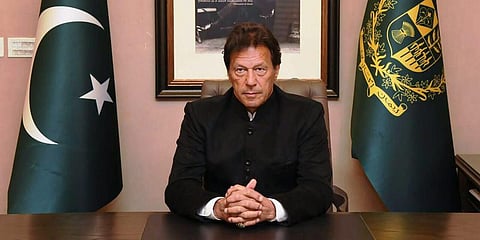

ISLAMABAD: Pakistan Prime minister Imran Khan on Friday said that no one was sure how long the COVID-19 pandemic would last as he announced a massive package to the construction sector to restart economy, as the number of coronavirus patients rose to nearly 2,500 in the country.
"We have decided that those investing in the construction sector during this year will not be asked about their source of income, he said while addressing the media in Islamabad.
He also announced a fixed tax regime on the basis of constructed area and offered 90 per cent tax reduction for investment in his 'Naya Pakistan Housing' project, which aimed to build houses for poor.
Khan announced to withdraw withholding tax on several sectors of construction, except cement and steel.
He also waived capital gain tax on sale of housing units by people.
He said his government will give construction sector the status of industry.
"We will open construction sector from April 14 and we will also see how we can open other industries, he said.
Khan also said Rs 12,000 per month were being given to support the most vulnerable families. He said 12 million families would get the support in the initial phase.
He also said that 400,000 volunteers have so far registered to join the Corona Relief Tiger Force to identify poor and help to convey food to them.
Meanwhile, Pakistan's coronavirus cases on Friday jumped to 2,458 as authorities struggled to stop congregational prayers in mosques.
So far 37 people have died due to the pandemic while 126 recovered.
Punjab province registered 928 coronavirus cases, followed by Sindh 783, Khyber-Pakhtunkhwa 311, Balochistan 169, Gilgit-Baltistan 190, Islamabad 68 and Pakistan-occupied Kashmir 9 cases.
The number of COVID-19 cases were increasing despite more than one week of partial lockdown to minimize the movement of the people.
Meanwhile, several mosques remained opened on Friday across Pakistan and people offered prayers there despite a government ban on big congregational gatherings in order to curb the spread of coronavirus.
The Sindh government had announced curfew like restriction from 12 noon to 3pm to stop people from visiting mosques, while the Punjab government had issued fatwa for people to offer prayer in their homes.
Similar instructions were issued by other provinces and the federal government.
The mosques made announcement urging people to pray at home, but some people defied the instruction and visited mosques, according to reports.
Some clerics also encouraged people to attend prayers in mosques.
"The government and police are making statements to create a sense of fear. Nothing will happen. Karachi is a city of 20 million, the government cannot implement its decision in every nook and cranny, the prayer leader of the Jamia Mosque Quba told The Express Tribune.
Reports from different areas of Karachi suggested that the majority of mosques followed government orders, however, some continued to hold regular prayers.
In other towns and cities of the province, including Sukkur, Larkana, Hyderabad and Mirpurkhas divisions, the doors of most of the mosques were locked with only four to five people, including the prayer leader, allowed to pray.
But in rural areas, especially in villages, the ban could not be implemented.
We have offered Friday prayers in our Jamia mosque with the same crowd," said Abdul Hanan, who lives in a village in the Kamber Shahdadkot district. The situation in Balochistan was not much different. A big crowd came to attend Friday prayers in Qandhari mosque in the provincial capital Quetta.
In Punjab, announcements were made from mosques urging the people to pray at homes.
In cities, the orders were mostly followed but the situation in the rural areas was different as people came out in big numbers to offer prayers.
Officials said that it was not easy to stop people from visiting mosques unless they willingly cooperate.
Dar ul Iftah Jamia Naeemia, an Islamic university in Lahore, issued a fatwa, saying that people who are stopped by the government from coming to mosques were not obliged to perform the prayers in congregation.
There were reports of confrontation between police and people on the issue of going to mosques in some parts of Karachi.
Last week, the Grand Imam Shaikh of Egypt's Jamia Al Azhar, an authority on Islamic injunctions, and the Supreme Council in Egypt, issued a fatwa on the request of Pakistan President Dr Arif Alvi, empowering the head of the state to suspend Friday prayers in the wake of the coronavirus outbreak.
Alvi had asked clerics in Pakistan to act as per the principles of Islam from Quran and Sunnah, and said it purely Islamic to cancel Friday prayers over coronavirus concerns, The News reported.
In several Arab countries, the 'azaan' (call for prayer) has been amended and now it urges people to pray in their homes.
Meanwhile, Pakistan is trying to treat the COVID-19 patients through plasma of recovered patients, and the first case in Pakistan, who recovered last month, donated plasma in Karachi.
Earlier, Tahir Shamsi, a renowned hematologist of National Institute of Blood Diseases, said the technique could be used to treat patients and China also used it effectively.
Meanwhile, Radio Pakistan reported that the World Bank has approved USD 160 billion emergency aid, including USD 200 million to Pakistan, over 15 months to help countries deal with the impact of the global coronavirus pandemic.